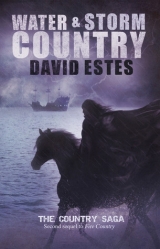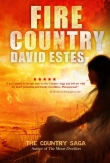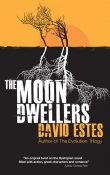
Текст книги "Water & Storm Country"
Автор книги: David Estes
Жанры:
Научная фантастика
,сообщить о нарушении
Текущая страница: 7 (всего у книги 21 страниц)
Chapter Thirteen
Huck
“Captain Montgomery,” my father says with a warm smile as he steps across the planks between The Merman’s Daughter and The Sailors’ Mayhem.
The two men shake hands like old friends as I watch from afar, standing next to Hobbs, Barney closer than I’d like on my other side. Although there’s no way my father wouldn’t be able to see me, he doesn’t offer even the slightest glance in my direction.
“You’ve improved your ship’s speed, I see,” my father says. “You were still the last ship to arrive, but we didn’t expect you until nightfall.”
Jeb smiles broadly. “I’m glad you noticed, Admiral,” he says. “Sometimes the only way forward is through threat and punishment. We sent three men to the brig just today.”
A heavy wad forms in the back of my throat. How dare he—
I take a step forward, fully prepared to set the record straight, but Hobbs stops me with a strong arm across my chest. “It would be unwise to interrupt,” he says. “Do not fear, Lieutenant, I’ll provide a full report to your father. You’ll get credit for what you’ve accomplished.”
I look up at Hobbs’ scarred face, my eyes wide with surprise, both because he’s going to vouch for me and because he called me Lieutenant for the first time. I offer a smile but he just glares down. “You can wipe that smile off your face, boy, you’ll also get credit for what you haven’t done.”
My smile fades and the face of the bilge rat girl appears in my mind. Letting a bilge rat—and a girl at that—mock me without repercussion won’t impress my father in the least. I can only hope that my leadership with the oarsmen will be enough to overshadow my weakness.
I stand at attention as my father finishes his formalities with Jeb. The captain steps aside and pretends to busy himself with giving orders to a few of the men who’ve stopped to watch.
My turn, I think. I watch my father approach, his every move commanding attention.
Not once do his eyes touch upon mine.
“Lieutenant Hobbs,” he says, standing right in front of me. “Will you walk with me?”
“Aye, aye, Admiral,” Hobbs says. They break away, cross the main deck, and climb the stairs to the lofted quarterdeck.
I’m invisible.
“Don’t worry, Lieutenant Jones,” Barney says, “Lieutenant Hobbs will tell ’im what you did.”
I nod vaguely in Barney’s direction, but I don’t say that Hobbs telling my father everything is exactly what I’m worried about. Then, looking down, I stab the tip of my boot at the spotlessly clean deck, seeing the pretty face of the mean bilge rat in the shine of the wood. Why didn’t I stand up to her like I stood up to Webb?
“Is that the Lieutenant Jones?” a faraway voice shouts.
I look up excitedly when I hear the familiar voice. “Cain!” I say, not caring that my overzealous reaction is likely not becoming of a lieutenant.
Cain’s dark hair is tied in a ponytail, leaving his face visible save for the beard that’s grown slightly longer in the two days that’ve passed since we parted ways. He leaps from the plank and embraces me, slapping my back hard with his palm. “How’s life on the dreaded Mayhem?” he whispers sharply, looking around with comically wide eyes, as if there might be sea monsters lurking in the shadows.
I laugh, look up at him. “Not as bad as I expected,” I say.
“The rumors are flying already,” he says with a wink.
“What rumors?” I ask, following him across the deck.
I match his stride as he makes his way to the fore decks. A white-winged gull passes overhead, catching my attention. As I walk, I follow its flight to the main mast, twisting my neck around. A brown bulge hangs on the thick wooden column. The gull continues flying, but I settle my gaze on the brown lump. Not a lump, or a bulge—a person. A brown-skinned bilge rat, clinging to the mast with one hand, bare feet wrapped around the wood cylinder, her other hand clutching a brush, scrubbing at the salty mast as if cleaning it might save her very life.
Her long, dark hair hangs down in waves, billowing under the strength of the breeze. She looks down and sees me, and our eyes meet, and I know I’ve stopped walking while Cain continues on, maybe answering my question, maybe not; I don’t know, I don’t care, because the bilge rat smiles at me and she’s really very pretty, with striking features that I can’t seem to look away from.
I smile back, despite how she mocked me in front of my men, how she ruined any chances of me winning my father’s respect, because something about her just makes me want to smile.
She raises the hand with the scrub brush and my smile drops, though I don’t know why. And I’m frozen to the deck, watching the smiling girl, waiting for her next move, captivated by her.
She whips her hand back and throws the wooden brush, and I know I need to get out of the way, because it’s coming hard, end over end, and her aim is good, but still I can’t seem to lift my legs, because she’s still smiling—behind her act of violence she’s smiling.
I try to cover my head with my hands, but it’s too late, and the wooden brush handle cracks me in the forehead, knocks me back into something, the railing or a barrel or something else.
My minds whirls and explosions of light pop and burst before my eyes and then all goes black.
~~~
The wind whips my hair over my ears and around my face. The salt stings my cheeks but I’m smiling because I’m going to meet my mother on the fore deck. She’s promised to watch the sunset with me. Already the sky is changing from red to deep purple, splashing orange and pink around the pillow-like clouds.
But wait.
Mother’s already leaning on the railing, but her gaze is downward, into the sea, rather than up at the breathtaking colors of the water country sky. All that lies in the churning whitecaps is death.
And I know.
I know.
Because I’ve been here before—and it’s what some of the men on the ship call “salty memories”, when you see something for the first time, but it’s like you’ve seen it before, maybe many times, and it hits you so hard it’s like a punch to the face. And I want it to stop—please stop—because I know how this one ends—how it always ends—how it has to end.
Blood in the water.
The smile fades from my face and my lips and jaw feel sore, like they’ve smiled too much and need to rest.
I’ve tried running, leaping, grabbing my mother just as she topples over the handrail, willing myself to be stronger with each subsequent effort. And each time he’s there to watch, my father, unwilling to help, disgusted by my failure as my mother meets a wet and silent doom at the hands of the sharp-tooths and the Deep Blue.
I can still save her—can’t I? Why else would I have chance upon chance? Somehow I know it’s the only way to end this nightmare, to gain my father’s respect once and for all.
Save her.
Be faster.
Be stronger.
Be smarter.
I realize I’ve been going about it all wrong. And it’s another one of my father’s lessons that marks the change in my thinking: “Speed and strength only get you so far. Brains set you apart from the common sailor.”
I’m wasting time and any moment the big wave will hit the bow and my mother will be thrown off balance and she’ll fall down, down, down.
But I don’t move because my brain tells me not to. I stand, watching. Waiting.
And the wave never comes. Minutes pass and still she stares into the murky waters, which are quickly darkening to black.
I’ve done it.
I have.
I walk toward her on tiptoes, afraid that my very footfalls might cause the ship to lurch, to buck her from its back like a Stormer’s horse.
She turns and her eyes are red and wet.
Somehow she falls, her eyes glittering with moisture as they catch the last rays of the dying sunlight. I’m too far away and, anyway, my feet are frozen to the planks, and all I can think is I saved her, didn’t I? but the answer comes from the side, when a shadow steps into view. Although the shrouded cloak of night has fallen over the ship like a storm cloud, my father’s eyes are clear and blazing in the darkness. They speak to me, and they say one thing:
You failed me.
~~~
“What happened?” the disappointed voice says.
I’m awake, but I keep my eyes closed, careful not to twitch. Two memories twist and spiral through my mind: My mother’s wet, red eyes pinch at the back of my head, causing a deep ache that makes my neck feel like dried, salted meat; the brown-skinned girl’s brush spirals through the air, thudding into my skull again and again, until my forehead throbs and throbs like waves crashing over me. Two memories of very different kinds of pain.
My father is nearby and I can’t face him like this.
“Uh,” Barney says.
“You’re his steward, aren’t you?” My father again, his voice laced with venom.
“Well, yes, but—”
“So you should’ve been nearby, right?” Not a question—an accusation.
“Of course, but—”
“And yet you didn’t see anything, is my understanding correct?” My father’s question hangs above me like a knife. With each moment that the question goes unanswered, I can sense the blade drawing closer and closer, until its sharp edge cuts into my throat and I have to hold my breath. Barney will tell him everything, and the bilge rat with the pretty, brown eyes and the unpleasant disposition will be chucked overboard quicker than a big-chin catches a fish.
“No, Admiral, I didn’t see anything,” Barney admits. I release my held breath out my nose, careful to keep it even and normal. Why I should be so concerned with the welfare of my attacker, I do not know, and I wonder whether the knock to the head has permanently dulled my senses.
She’s safe for now, and so am I.
“Lieutenant Cain—what do you have to say for yourself? I understand you were with Lieutenant Jones when it happened.”
No.
“I was,” Cain says, his voice firm and sure.
No.
“How did Lieutenant Jones end up unconscious with that mark on his forehead?”
Throb, THrob, THROB! The pounding in my skull, which moments ago was dull, albeit it ongoing, begins cracking like a hammer, and a wave of nausea passes through me. I feel my lips start to quiver as I strain to choke down chunks of undigested food while maintaining the ruse of being asleep.
“I don’t know,” Cain says, and my eyes almost flutter open in surprise. Surely he saw.
Surely.
“I was walking ahead of him, and when I looked back he was flat on his back, his forehead already starting to swell.” Could it be? No one saw what happened?
“We must conduct a full investigation,” someone growls. Hobbs. “A vicious attack on an officer cannot go unpunished. The result would be mutiny.”
THROB, THROB!
There’s a scratching sound and I can picture my father stroking his beard. “And you will conduct this investigation?”
“I will,” Hobbs says.
THROB!
“It will take a well-orchestrated team,” Cain says. “I would be pleased to assist, if you agree, that is.”
“You’re suggesting my top two lieutenants remain on the Mayhem indefinitely?” To my surprise, my father’s tone—which has all the evenness of stating a fact—doesn’t match his words, which imply disbelief at such an impossible suggestion.
“Admiral,” Cain says, “you know as well as anyone that The Merman’s Daughter could sail with half as many men. With some effort and a bit of luck, we’ll have the investigation wrapped up in a few days, at which time I can return to my post.”
“I really don’t think—” Hobbs starts to say.
“Done,” the admiral says. “Catch the attacker and bring him to me.”
The door slams so loudly I swear it’s right next to my ear. My head pounds with the force of a ship carried onto the rocks by a water country storm.
The world drifts away once more.
Chapter Fourteen
Sadie
Sweat and burning muscles and sore bones are nothing compared to waiting.
I’d train for a million more hours if it would mean my mother’s return. Barely a week has passed since the Riders left, but already my mind is past the point of distraction. When I eat, when I speak, when I rest, my every thought is of my mother.
Is she alive? Is she fighting yet? Is she thinking of me?
Although I know these questions are unfit for the mind of a Rider-in-training, they rise up again and again until I can’t concentrate on anything else.
My father isn’t helping. He barely speaks, barely eats, barely sleeps. He’s meditating when I lay down to sleep. When I awake, still he sits, eyes closed, hands extended, soft hums and deep breathing rising from his throat. Did he sleep? Has he slept since she left?
When I try speaking to him, his eyes remain closed, and he waves me away with a hand.
I am alone when I’m with my father.
I don’t spend much time in our tent.
Outside isn’t much better. It’s as if the camp is in mourning, the hush so loud I want to scream. When anyone does speak, it’s in whispers and with barely parted lips, the unidentifiable words deafening in the abject silence.
I don’t spend much time in the camp.
When I throw myself into training, it helps, but only for a day, until even the aches and pains are insufficient to drown out the questions in my mind.
Although gray clouds swarm above, it hasn’t rained for two days, as if the sky is gathering up every last raindrop, hording them for some unknown purpose.
As I walk along the beach, the sand is soft and cold and foreboding under my bare feet. I burrow a small hole, well back from the water. Today I fear the chill of the Deep Blue on my skin—which usually feels invigorating and life-giving—could have the opposite effect, carrying the Plague in its wet entrails. As if touching the water would make me shrivel and die.
I stare across the fathomless ocean until my gaze meets the deep, red, cloudless horizon. A drop of water splashes on my cheek, and I look up, sure that the clouds are about to open their overflowing gates.
A face smiles over me, tipping a water jug just enough to spill a drop at a time. Another splash, this time on my forehead.
“What do you think you’re doing?” I demand, rising to my feet in one swift motion, facing off against Remy, whose smile falters for a moment before springing back into shape.
“Thought you could use some water,” he says, shrugging, one foot aimed toward me and the other back toward the plains. He holds the jug in my direction. An offering. An apology?
I shake my head. What does he have to apologize for? After all, he was right. There was never a chance of me going with the Riders.
I stare at the jug, considering whether taking it would be the same thing as me apologizing.
My tongue is as dry as the sand, my mouth sticky. In the end, it’s selfish need that makes up my mind. “Thanks,” I say, grabbing the jug and taking a swig, wondering how he knew I was down by the water. Did he follow me?
Without answering, he sits next to my hole, gazes across the waters, not unlike I was doing. “Did you find what you’re looking for?” he asks, his eyes forward.
Chewing on the now-moist inside of my lip, I ease down beside him, trying to determine what he means. I take another pull of water to buy time, but when I glance back at Remy, his hand is out and he’s looking at me.
When I hesitate to return the jug to him, he says, “I hope I didn’t give you the impression the entire jug was for you. My mouth is rather dry too.”
Heat warms my cheeks, and it might be anger, but it might not be, which only serves to make me angry. I take a third drink, and the jug is beginning to feel light, but before I empty it completely, I pull it away from my lips and thrust it at him.
He smiles and accepts it, hurriedly pushing the vessel to his lips as if the water is slipping out the bottom. For some senseless reason, watching him drink from the same jug, watching his lips touch the same place that my lips just touched, makes me blush again, as if the moment is more intimate than it seems.
It’s only a water jug, I remind myself.
“Mm. Water tastes so much better when you’re thirsty,” Remy says, licking his lips.
I look away, don’t answer.
“Are you worried about your mother?” he asks, shoving the now-empty jug into the sand.
I glance at him sharply, and say, “Riders don’t worry.”
He raises an eyebrow. “Are you always this defensive about everything?” And then, before I can respond, he says, “I know, I know, you weren’t being defensive,” and I almost laugh, because he stole the words right out of my mouth, disarming me before I could attack.
“It’s the only way I know,” I say.
“Not everyone is trying to hurt you, you know,” he says, pushing a pile of sand forward with his foot, which is clad in a heavy, black boot.
“How would you know?” I say, and an echo ricochets off the empty places in my mind. PAW, Paw, Paw. And again, despite my objections to the contrary, I know I’m being defensive.
“Because I’m not,” he says softly, digging a heel into the sand.
“Do you think they’re alive?” I blurt out, jerking my head sharply away from him as soon as the words are out, trying to hide my shame. And what I really mean is: Do you think she’s alive?
To my surprise, I don’t feel his piercing brown eyes on me, and when I look back, he’s looking in the other direction, as if he’s ashamed to be having this conversation too.
“I…” he says.
I want to look away from him, because I don’t want to make him feel uncomfortable, and because I can see the worry lines on the side of his face, and because he’s guilty of feeling weak and helpless and un-Rider-like. Just like me. But I don’t look away, because seeing him like this makes me feel better about myself.
When he looks back at me, I flinch, because the shame and guilt I was so sure was plastered on his face wasn’t real, and the whole time he’s been smiling, grinning like a wildcat. “Let’s go swimming,” he says, and there’s such excitement in his voice you’d think we weren’t at war with the Icers and the Soakers, and that we were all about to sit down together to a giant feast.
“Swimming?” I say, unable to hide my astonishment at his suggestion.
“Why not?”
“It’s cold.”
“Not that cold.”
“There are monsters in the water.”
“Not this shallow.”
“It’s wet,” I say, wishing I could think of a better excuse.
“The water’s wet? Now that’s a strange idea,” he says, mocking me with both his words and expression.
“It’s getting dark,” I say, but it’s really not, despite the best efforts of the pregnant clouds.
“We’re going swimming,” he says, and this time it’s a statement and I get the feeling that he’ll try to carry me in if I don’t agree. I’d like to see him try, I think.
“I won’t force you,” he says, as if reading my mind. “But I’ll never forget how you were scared of a little water.”
And with that, he’s gone, whooping as he sprints for the ocean, running right out of his boots, tossing his shirt aside, and nearly tripping as his pants fall around his ankles. It all happens so fast that I barely catch a flash of his dark, bare skin before he dives into a wave, disappearing beneath the surface.
A moment later his head pops up. He delivers a smile that would rival the bottom quarter of a crescent moon. He gestures for me to join him.
I stand, suddenly feeling tingly in a way that both angers and delights me. Surely I can’t follow a naked boy into the ocean. Can I?
But my mother’s not around and my father’s lost inside himself and I’m feeling reckless, not in search of self-destruction but for a way to keep my mind off of the mission to ice country, and, well, this is as good a way as any.
I walk toward the water.
Remy’s smile grows bigger as he splashes in my direction.
I step into the water, feeling an instant buzz through my body as the coolness fills me from the bottom up.
“Your clothes are going to get all wet,” Remy says, a gleam in his eye.
“Keep dreaming,” I say, taking another step.
“I’ll turn around,” he says, demonstrating by whirling away from me. “And I won’t peek.”
Surely I can’t. Surely.
My mother’s face burns through my mind and I clamp my eyes shut against it but still it remains, flames licking at her hair and her eyes and her lips, and I can’t make it go away.
I can’t.
Unless…
It’s crazy, but—
I pull off my shirt, holding it across my breasts, watching Remy for any sign that he might turn his head. The wind licks at my skin and instead of cold, it’s warm, and exhilaration swarms through my head and chest. My mother’s face is gone, I realize.
Remy stays facing away and I toss my shirt aside, well out of reach of the rising waters. My pants are next and I discard them quickly, pushing forward into the water and slipping below before even the circling gulls can see me.
The ocean washes away all my fears.
“Are you in?” Remy says when I surface.
“Yes,” I say. “Thank you for not looking.”
Remy turns, his short, black hair shiny and speckled with water droplets. “That’s two thank yous in one day,” he says. “I must be growing on you.”
“Don’t get used to it,” I say, splashing him, feeling foolish even as I do it. And yet, even as a fool I feel better now than I did sitting alone on the beach with my dark thoughts.
I can tell he’s about to splash me back, and I’m already turning my head and closing my eyes—
–and then I hear it. A shout. A cry. First one, then two, then a chorus.
I don’t know if Remy splashes me or not, because I’m already facing the shore, searching for…
The Riders.
Black and shadowy and riding like the wind across the plains, and there’s something wrong, because…
There are so few of them.








